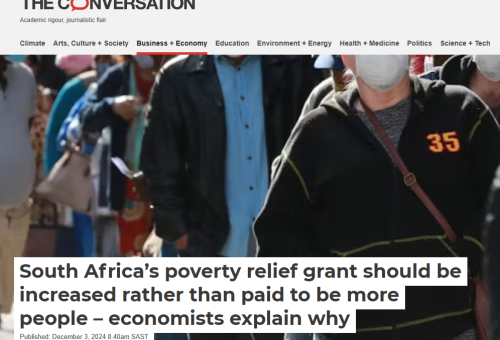
South Africa’s poverty relief grant should be increased rather than paid to be more people – economists explain why
Kate Orkin et al.
The Conversation Africa, 03 December 2024
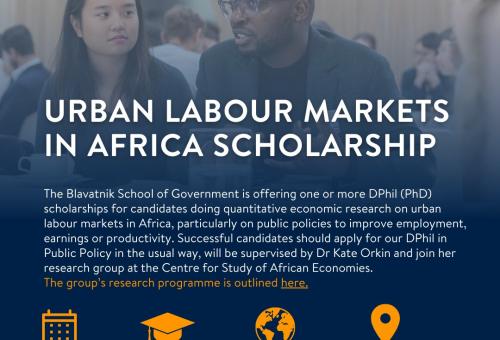
The Blavatnik School of Government has announced they are offering a new studentship for DPhil doing quantitative economic research on urban labour markets in Africa, supervised by the MBRG's Kate Orkin.
Apply by 09 January 2025
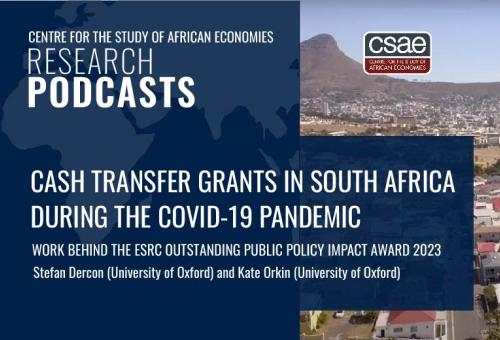
Lead of the MBRG Kate Orkin talks to CSAE Director Stefan Dercon about the work behind the ESRC Outstanding Public Policy Impact Award 2023 on with cash transfers grants in South Africa during the Covid-19 Pandemic in episode nine of the CSAE Research Podcasts series.
You can listen to the conversation via the University of Oxford Podcasts or Apple Podcasts, or watch the discussion on the CSAE YouTube channel.
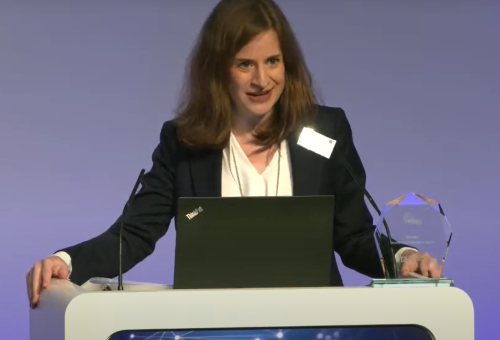
MBRG lead Kate Orkin has won the ESRC award for Outstanding Public Policy Impact, for her role advising the South African government during COVID-19 and beyond. She influenced £4.87 billion in spending that helped 28.5 million people and saved 5.5 million from extreme poverty.
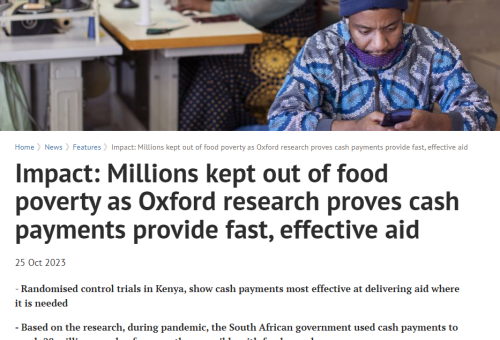
MBRG research on cash transfer payments in Kenya and South Africa featured on the University of Oxford news website.

The MBRG's Kate Orkin has been nominated for the Economic and Social Research Council Impact Prize 2023 for the extraordinary impact of research-driven poverty relief measures in South Africa.
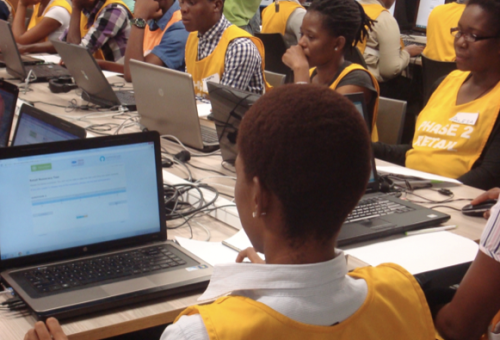
The MBRG's Kate Orkin and co-authors partnered with the South African NGO to study how information from soft skills assessments could be shared to alleviate labour market frictions between firms and young workseekers. Click for a VoxDev summary of results.
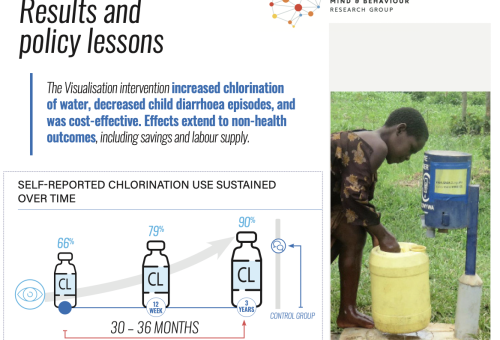
Research by the MBRG's Kate Orkin and collaborator Anett John was published in the June 2022 issue of the Journal of European Economic Association. See here for the policy note.
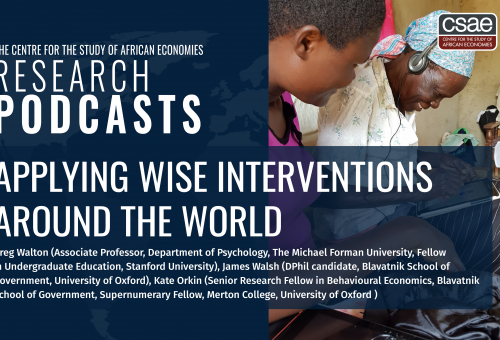
Dr Greg Walton and Dr Kate Orkin discuss 'wise interventions', and how social science can use this psychologically approach to understand the major problems in social life - poverty, social exclusion, child abuse, and discrimination.
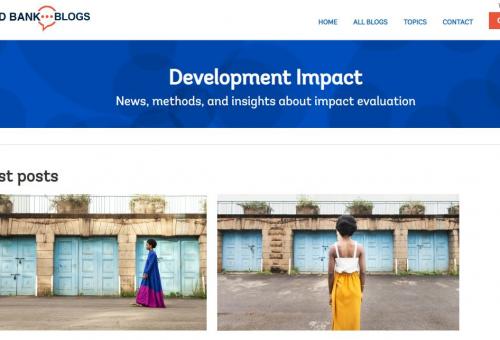
In his weekly links for the Development Impact blog, David McKenzie features an MBRG measurement matters series post from Lukas Hensel on measuring income expectations using phone surveys.

Marta Grabowska features in the World Bank's Weekly Links blog with her Measures Matter post on psychometric validation for non-cognitive skills.
The UNDP Accelerator Lab in The Gambia is launching an exciting new soft skills training programme for young people who have lost their jobs because of COVID-19. The program will be adopting a labour market intervention developed by Carranza, Garlick, Orkin and Rankin (2020) to reduce labour market friction between prospective employers and young work-seekers.
Addressing information frictions by improving skills communication between work-seekers and potential employers can increase earnings and positive employment outcomes. Carranza, Garlick, Orkin and Rankin (2020) discuss how a skills assessment intervention has had positive outcomes for young work-seekers in South Africa.
Carranza, Garlick, Orkin and Rankin (2020) discuss their latest paper, showing that assessing young work-seekers’ skills can increase earnings and employment and help prospective employers too. With 67.6 million people aged 15-24 unemployed in 2019, the potential of this intervention to mitigate labour market frictions is exciting.
The implementation guide (toolkit) to support the implementation of a cost-effective labour market intervention developed by Carranza, Garlick, Orkin and Rankin (2020) is now available to download from the MBRG website. The intervention outlines a skills assessment programme that benefits both work-seekers and prospective employers by addressing information frictions between the two parties. We are grateful for the positive feedback from the World Bank's David McKenzie over on the Development Impact blog.
Carranza, Garlick, Orkin and Rankin (2020) discuss their latest paper, showing that assessing young work-seekers’ skills can increase earnings and employment and help prospective employers too. With 67.6 million people aged 15-24 unemployed in 2019, the potential of this intervention to mitigate labour market frictions is exciting.
In the Oxford Science blog, Dr. Stefan Dercon writes about no-regret policies for education in the wake of the COVID-19 pandemic.
In partnership with the Psychiatry Department at Oxford University, CECD Blackpool has made a film full of tips for parents on how to talk to young children about the Coronavirus.
Dr Louise Dalton, Dr Elizabeth Rapa and Prof Alan Stein look at how guidance around communicating diagnosis of a life threatening condition to children can be adapted to the current COVID-19 situation.
Why have governments shifted to using cash in low and middle-income countries? Dr Kate Orkin discusses the evidence supporting cash-transfers and how governments are trying to cope with widespread economic shocks and job loss caused by COVID-19.
Claire Cullen and Mahreen Mahmud feature in the World Banks blog on survey methods, and offer insights into using audio computer-assisted self-interviewing (ACASI) as a tool for conducting surveys on sensitive topics.
Dr Kate Orkin joins a specialist panel selected by the UN Office for Disaster Risk Reduction to discuss how we respond to risk and how insights from behavioural economics can inform policy and media communications.
In coordination with a new World Bank report, Dr. Stefan Dercon joins a panel of experts to discuss a new World Bank's report on how the current situation presents a window of opportunity to prepare for the future, apply 'no-regrets' policies and refresh the way we approach education.
In this VoxDev talk, Clement Imbert and Kate Orkin discuss the tools available to policymakers in developing countries that best mitigate the economic effects of the COVID-19 pandemic on society’s most vulnerable, including job retention schemes, low interest credit, and unconditional cash transfers.
How to prevent a hunger crisis due to COVID-19? Using examples from around the world and drawing on findings from rigorous research, Kate Orkin argues that cash-transfers are an effective tool for low and middle-income countries and debunks some of the negative myths surrounding them.
How to soften the economic blow of COVID-19? Kate Orkin discusses the stimulus package put together by the South African Government including the expansion of social grants and why cash transfers can be more effective that giving out food parcels.
In an overview of the South African Government response to COVID-19, Kate Orkin reflects on the importance of both a humane response and long term investment to protect the social grants system currently in place.
Kate Orkin discusses the evidence in favour of using cash rather than food for emergency social relief, why cash transfers to the poor are a long term investment as well as an immediate fix, why people use cash responsibly and how to cover those not currently enrolled in grants systems.
Right now, this week, we need to get money out fast to stop people falling into extreme poverty. Decades of research tell us that we have no time to lose. Kate Orkin writes about social protection efforts in response to COVID-19.
Kate Orkin spoke to Eusebius Mckaiser, South Africa's leading radio breakfast show, to discuss how government can use various social security mechanisms like the child support grant, to bring relief to the most vulnerable in the context of COVID19 shocks. The show was based on a brief at econfip with Prof Clement Imbert and Francois Gerard.
In a CGD blog post, University of Oxford's Stefan Dercon offers three key lessons for low-regret decision making under extreme uncertainty: collect data now to reduce uncertainty; change and adapt decisions if the data require it; and focus on trust and communication.
The lockdown in South Asia has led to mass migration of people back to their home towns and villages as the work opportunities in urban centres shrink. Researchers discuss the public health risk this poses to rural areas.
Researcher Mahreen Mahmud contributes to the World Bank's South Asia Economic Focus Spring 2020 Edition on how migration data may provide a way of predicting high risk areas for the spread of coronavirus for policy makers (see Box 1.1 in report).
François Gerard, Clément Imbert and Kate Orkin argue that by using a broader patchwork of solutions than higher-income countries, low-income and middle-income countries can cast an emergency safety net with extensive coverage.
Will people do as they're told? Kate Orkin speaks with the BBC to discuss how behavioural science can aid COVID-19 government prevention strategies and the power of role modelling good behaviour.
People need simple choices, not suggestions, in the COVID-19 crisis. Researcher Kate Orkin discusses this in a recent University of Oxford blog as well as discusses how people do things that are good for them and for the community by default.
A VoxEU.org column co-authored by researcher Lukas Hensel discusses using Google search activity and individual survey data to document a rapid increase in economic anxiety in the US in response to the initial global spreading of the virus.
Citing Lukas Hensel's research, a Hargreaves Lansdown story looks at hysteria in today’s market and tells us three things that may indicate when markets will begin to rise again.
The UK Government is asking people to limit non-essential contact and travel to work from home in order to slow the spread of COVID-19, but this relies heavily on individuals complying. A University of Oxford blog asks: will this strategy work?
Thiemo Fetzer, Lukas Hensel and Cristopher Roth study how the arrival of the new coronavirus leads to an increase in economic anxieties both through inferred patterns around Google search activity and through a survey experiment in a representative sample from the US.
Online searches for recession and survivalism topics are increasing, a sign that a dramatic slowdown in growth is likely, write Thiemo Fetzer, Lukas Hensel, and Christopher Roth.
The rapid and global spread of the new coronavirus within just a few months is threatening to infect the global economy, new research by Lukas Hensel has found.
What should the private sector do to help strengthen economic recovery? How can financing be more effective during the pandemic? A Q&A with Stefan Dercon and IFC Insights discusses how lessons from the Ebola epidemic can inform the private sector’s response to COVID-19.
In a New York Times opinion piece, Stefan Dercon encourages governments to break away from medieval reactive approaches and to prepare for disasters using data, highlighting achievements that would not have been possible ten years ago.
Dr. Johannes Haushofer and Dr. Kate Orkin discuss UBI and cash transfers at the most recent Behavioural Exchange conference.
The Harambee Youth Employment Accelerator CEO highlights new research on what is driving mismatches between young South Africans searching for work and businesses who say they struggle to hire.
The New York Times discusses a study by researcher Emma Riley, which shows improvements in Ugandan students' national exam scores after watching the Disney movie Queen of Katwe.